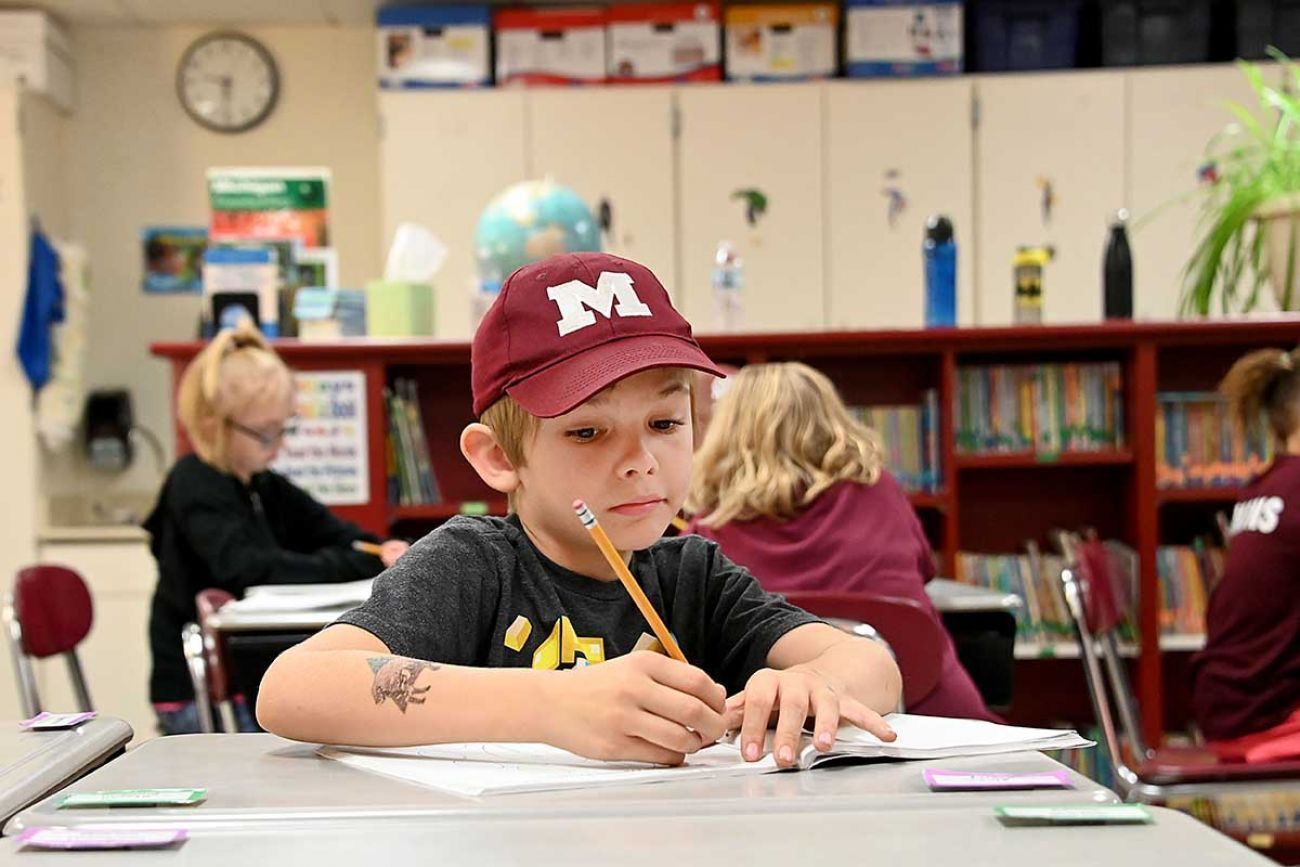Michigan’s 3rd-grade reading scores show the cost of remote COVID learning


- The percentage of third-graders a year or more behind in reading went up 20 percent this year
- Results were far worse for students with significant remote learning during COVID, low-income students and students of color
- Experts: This underscores need to prioritize COVID funds and other supports to give struggling students individualized help
Researchers found alarming increases in the proportion of Michigan third graders reading significantly below grade level and widening gaps in performance between Black and white students, and between students from low-income families and peers from wealthier families.
The performance disparities provide more evidence of the pandemic’s disproportionate impact on at-risk children.
“This should be a clarion call to us,” said Katharine Strunk, director of the Education Policy Innovation Collaborative at Michigan State University. “What are we doing to help these particular students?”
Related:
- Math, reading scores plummet on national test, erasing 20 years of progress
- Critical race theory flap makes teachers tiptoe on slavery, racism topics
- Michigan to deepen Native American history in social studies standards
The education research group EPIC on Thursday released its annual data report on the number of students eligible for retention under a controversial Michigan law that says third graders can be held back if they score at least a year behind grade level on the reading portion of the Michigan Student Test of Education Progress, or M-STEP. The report is based on results of reading tests given this spring.
The results are important because they help policymakers and schools target resources. They’re also a gauge of the effects of the pandemic on young children during crucial years when most children learn to read. Some researchers say reading by third grade is “a make or break benchmark” correlated to later academic success.
Nearly 5,700 of last year’s third-graders scored low enough to be eligible for retention. That’s 5.8 percent of all third-graders, up from 4.8 percent the previous year. The Michigan Department of Education hasn’t yet collected data on how many of them are actually repeating third grade this year.
More than half would have been eligible for automatic exemptions based on, for example, their status as English learners or special education students, according to EPIC’s report. In the past, the vast majority of others were exempted too, because administrators and parents agreed that retention was not in the child’s best interest.
It rarely is, said Elizabeth Birr Moje, dean of the University of Michigan School of Education.
“Everything we know from research tells us that retention at a young age has negative consequences across the board,” including on dropout rates, future earning potential, and incarceration rates.
That’s one reason why the Reeths-Puffer School District near Muskegon promoted all third graders to fourth grade, even though 10 of them had reading scores that made them eligible for retention. Instead, those students will get extra help with reading this year, Superintendent Steve Edwards said.
“You’d struggle to find much evidence anywhere of the long-term benefit” of retention, he said.
Academics are more focused on what the M-STEP data reveal about learning disparities between demographic groups than on the retention component of the third-grade reading law.
“The hope with the retention law was not so much that we would actually be retaining children but that it would motivate people — whether families, or teachers, or school leaders — to do early intervention, to engage kids (in reading) very early,” Moje said.
The retention law also provides an accountability benchmark to let parents and community members know how well their schools are educating children in early literacy. And it helps schools focus resources on students who need the most help.
Advocacy groups like Education Trust-Midwest are concerned by the results.
“While it’s not surprising that so many children have fallen so far behind, we are now seeing the evidence of the impact of the pandemic, especially for underserved students,” said Executive Director Amber Arellano.
Michigan’s declines mirror results of the National Assessment of Educational Progress also released Thursday. NAEP scores show sharp declines across the country in math and reading during the pandemic. Among 9-year-olds who took the national test, reading scores dropped more sharply than they have in more than 30 years.
Remote learning and pandemic-related disruptions emerged as clear factors in student performance on the M-STEP.
Of Michigan third graders who spent all or most of second grade learning remotely, 10.6 percent were eligible for retention, twice the rate for those who learned in person all or most of their second-grade year.
In Reeths-Puffer schools, where students attended in person for all of 2020-21, 34 percent of students scored at or above the proficient level, down from 38 percent in the last two test cycles. It might have been worse if Reeths-Puffer schools had closed to in-person learning that year, as 16 percent of Michigan districts did for at least part of the year. Another 16 percent used hybrid models, teaching partly online and partly in classrooms.
“Most students learn best in a face-to-face environment,” said Edwards, the superintendent. “From a social-emotional and academic perspective, being face-to-face as much as we were at least mitigated what was a very difficult situation” during the pandemic.
But that doesn’t necessarily mean that remote learning alone caused sinking scores, Strunk said.
Black students and those from low-income families, who historically underperform white and wealthier peers, were more likely to be in districts that used remote instruction during the pandemic.
Fifteen percent of Black third-graders scored low enough to be eligible for retention. That’s grown from 13 percent in 2020-21, and 10.9 percent in 2018-19, before the retention law took effect. Students were not tested in 2019-20 because of the pandemic.
Meanwhile, the percentage of white third-graders eligible for retention grew from 2.3 percent in 2018-19 to 3.3 percent last school year.
“That’s a very large gap between Black students and everyone else, so we have to ask what’s happening there,” Strunk said.
The performance of students from low-income families is concerning, too, she said. Nine percent of third-graders from low-income families last year scored low enough to be eligible for retention, compared with 6.3 percent before the pandemic.
Among more affluent students, 2 percent were eligible for retention last school year, compared with 1.3 percent before the pandemic.
The state’s lowest performing schools also saw big declines in third-grade reading scores. Those buildings have been designated by the state as partnership schools based on factors including low graduation rates, attendance, and test scores. Those schools – including many in Detroit — have been in a turnaround program for the last three years and had shown progress before the pandemic.
A quarter of third-graders in partnership schools were eligible for retention based on 2022 scores, up from 22.3 percent last year, and 19.1 percent in 2018-19.
“Partnership districts have really been through it over the last couple of years,” Strunk said. “The communities in which partnership districts and schools exist faced the most dire economic and health consequences of the pandemic. We need to be working as hard as we can to support those communities and schools so they can help students recover from an unbelievably challenging time.”
Policymakers, administrators, and teachers need to target resources to districts and students struggling the most, Strunk said.
“I’d be doubling down on training our teachers to help them teach kids who may be very, very far behind grade level,” she said. “I don’t think we can assume they will catch up without targeted intervention and support.”
Schools in Michigan and across the country received federal COVID relief dollars that can be used, in part, to provide tutors to improve reading skills, but districts are having trouble finding enough tutors to meet their needs.
Arellano said those interventions should include specialized support for students with dyslexia. That’s an area the state Senate has begun to prioritize with legislation that advanced in May, although the state House hasn’t yet taken it up.
Schools seem to be working with parents to help struggling readers instead of holding them back from fourth grade, said Mike Testa, a member of the Michigan PTA Advocacy Committee and parent of four Livonia Public Schools students.
“Districts have done a good job working with parents to see what is actually best for that specific student,” he said. “They’re coming up with a course of action and a plan, not just putting a kid in fourth grade with no support but actually doing something to get that child caught up.”
That’s the kind of approach Moje advocates.
“Reading is a very complex endeavor” that requires an understanding of phonics, an ability to understand clues from syntax, an understanding of how sentences are put together, and a comprehension of meaning, she said.
“You have to assess where children are, why they’re there, and then intervene appropriately,” she said. “The sheer volume of children makes that difficult.”
She is hopeful that schools will be able to help struggling readers catch up to their peers.
“The idea that if you can’t read proficiently by third grade you’re doomed is a fallacy,” Moje said. “Somebody has to be intervening to help you make progress, but it’s not actually the case that you stop learning to read at third grade.”
Tracie Mauriello covers state education policy for Chalkbeat Detroit and Bridge Michigan. Reach her at tmauriello@chalkbeat.org.
See what new members are saying about why they donated to Bridge Michigan:
- “In order for this information to be accurate and unbiased it must be underwritten by its readers, not by special interests.” - Larry S.
- “Not many other media sources report on the topics Bridge does.” - Susan B.
- “Your journalism is outstanding and rare these days.” - Mark S.
If you want to ensure the future of nonpartisan, nonprofit Michigan journalism, please become a member today. You, too, will be asked why you donated and maybe we'll feature your quote next time!


